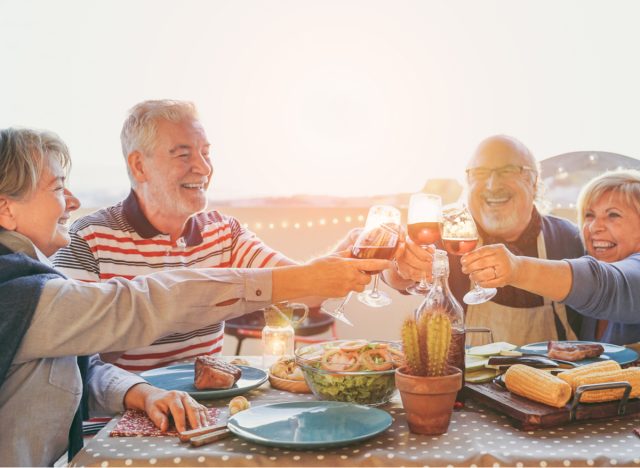5 Tips To Live a Long Life, According to a Longevity Expert

Most of us hope to age well and live a long life. And while researchers believed for a long time that a person's longevity was primarily determined by genetics and family history, experts are beginning to discover that there are many more pieces to the puzzle.
Research now shows that other factors such as environment, lifestyle choices, socioeconomic status, mental health, and community are just some of the things that can affect your lifespan apart from genetics. Some of these factors are obviously impossible or harder to control than others, so we wanted to learn more about the ones that we can control.
That's why we spoke with Michael Roizen, M.D., author of the Great Age Reboot and founder of the Reboot Your Age program to get his tips for the best practices for longevity. Read on, and for more healthy aging check out 6 Best Breakfast Habits to Slow Aging.
Change your attitude.

According to Dr. Roizen, not enough people realize that their attitude and daily life choices can make a difference in their longevity.
"The largest error is thinking that your choices do not make a difference, but making healthy choices early and consistently allows you to enjoy good health and a longer life," says Roizen.
He also notes that your mindset can actually alter the genes in your body. "We know from much data since the Human Genome Project was completed that you control over 80% of whether your genes are on and making proteins, or are off and not making proteins."
Other research has found similar results to suggest that your brain and thought patterns can alter your genes. This is why, as Dr. Roizen puts it, "you are a genetic engineer for your own health."
Of course, the power of positive thinking alone will not guarantee longevity for everyone, but the point is that your state of mind affects your physical health, so having a positive mindset is a great place to start when it comes to aging in a healthy way.
Only eat food you love and that loves you back.

"Food is a relationship like a marriage—you should only eat food that loves you back," says Dr. Roizen. While this depends on your own unique needs, Dr. Roizen provides some examples of great foods for longevity. "Try drinking your coffee black without cream or sweeteners, and brewed through a filter, and enjoy things like EVOO, avocados, salmon, and blueberries."
If you look at the Blue Zones, which are areas across the globe that have the highest concentrations of centenarians, you'll see that healthy eating is a large component in their longevity equation. Although each region has its own specific cuisines and local delicacies, some patterns and correlations do emerge—a typical diet in the Blue Zones tends to be high in fiber, healthy fats, and plant-based foods (think: lots of fruits and vegetables), and low in processed foods.
Try the fasting-mimicking diet.

According to U.S. News, fasting-mimicking is a way of reaping the benefits of fasting without having to actually stop eating. This five-day "fast" can be done once a month for three months (and during those five days, you should be consuming at least 70 ounces of water per day).
Because this is a highly specific method of fasting, it's crucial to talk with your doctor before trying it out. But Dr. Roizen suggests that for some, the so-called fasting-mimicking diet may be beneficial for longevity.
"You can help regenerate your telomeres (which are DNA structures vital to the cellular aging process) with the fasting-mimicking diet for five days each month," he says. "This requires going on a low-protein, low-simple-carb diet of about 1,000 calories on day one, and 750 calories for the next four days, and then returning to a Mediterranean-style diet on day six."
Train your brain for speed.

According to Dr. Roizen, it's also important to focus on your brain health as you age.
"You want to train your brain for speed. Two studies found that 70- to 75-year-olds who played speed-of-processing games for just 18 hours over a 10-year period experienced more than a 25 percent decreased risk of dementia over those 10 years," says Roizen.
Another similar study, which was published in Scientific Reports, used Cognitive Mobile Games (CMGs) to analyze scores of people ages 60 to 80 years old. Among the participants, those who played the CMGs improved their scores after 100 sessions.
Manage stress and cultivate your posse and purpose.

Dr. Roizen adds that managing your stress levels, finding your purpose, and being part of your community are all important aspects of greater longevity and living a longer life. One Harvard study even found that being in a community and feeling happiness may be more important to a long life span than your genes.
Researchers have found that these qualities are not only practiced in every Blue Zone region, but are highly valued. According to Blue Zone research published in the American Journal of Lifestyle Medicine, these regions practice a "downshift" to reduce stress, which can look like meditation, moments of prayer, happy hour with friends, an afternoon nap, or visits with neighbors.
In Okinawa, Japan (one of the five Blue Zones), people value community through moai, or life-long circles of friends; in Nicoya, Costa Rica, they value their pan de vida, or purpose to live. At first glance, you may not think these practices can contribute to a longer life, but experts say they play a significant role.









